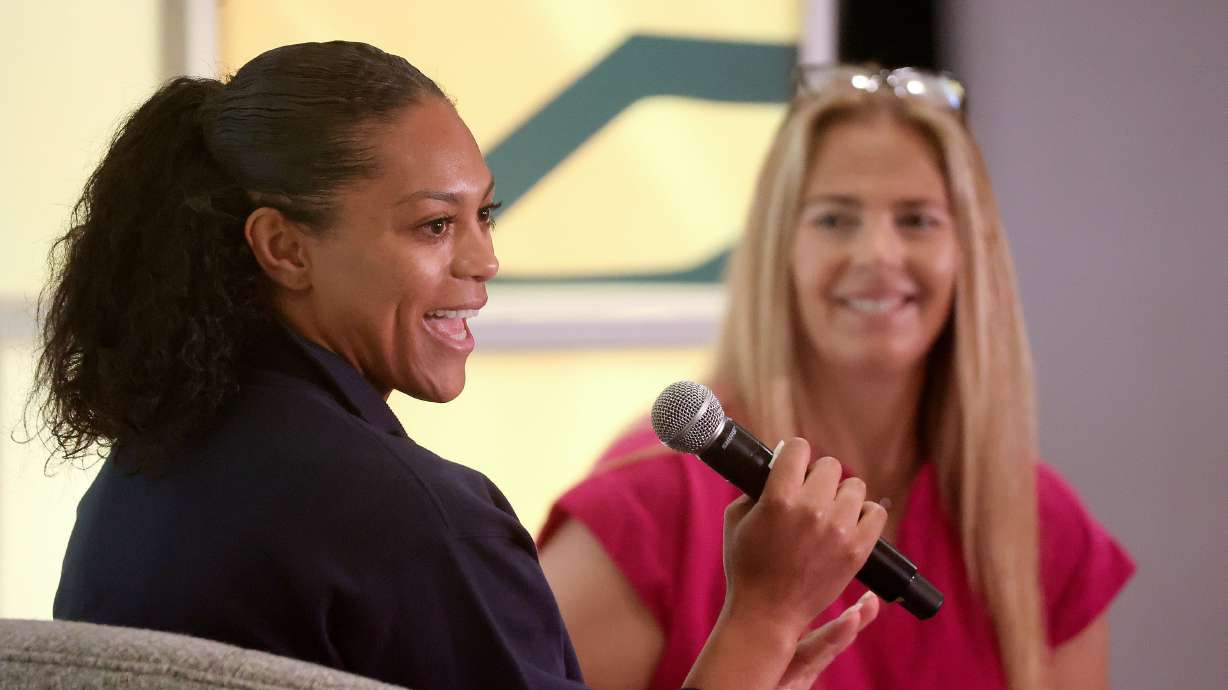- Kaysha Love, a world-champion bobsled driver from Utah, shared insights on fear at SALT Summit Tuesday.
- Love's journey from sprinter to bobsledding champion involved overcoming significant challenges.
- She emphasized teamwork, motivation, resilience, and her aims for future Olympic success.
SALT LAKE CITY — World champion bobsled driver Kaysha Love, of Herriman, will never forget the first time she gave the sport a go just five years ago.
Then a sprinter for the University of Nevada, Las Vegas, track team, she was recruited to attend a push camp at the Lake Placid, New York, sliding track. Despite growing up in the state that hosted the 2002 Winter Games, Love had never seen a bobsled before showing up at the track.
"They don't really give you a whole lot of the 411 before you jump into your first bobsled ride," she told several hundred hospitality industry representatives gathered Tuesday for the second annual Salt Summit at the Marriott Hotel in downtown Salt Lake City.
That's on purpose, Love explained during an hourlong onstage conversation with legendary Olympic ski racer turned sports commentator Picabo Street, who retired in 2002 after competing in Utah's last Olympics.
"If they tell you that it's a really rocky ride, it can kind of get intense (and) a little scary, I think they would definitely not get a lot of athletes to come try it," Love said. "They told me, 'Push as hard as you can for six seconds and jump in the sled.'"
The rest, she was instructed, was up to the bobsled pilot, who would cue her when it was time to pull the brake. So Love pushed the sled and jumped aboard, already out of breath because, she noted, no one had mentioned it weighed some 800 pounds.

Turning fear into motivation
After holding her breath all the way down, nearly to the point of passing out, Love said she was feeling "all the emotions" and wasn't sure she was ready for another run. Then a coach told her that her push start already nearly matched that of members of the national team.
Love, who'd started her athletic career in gymnastics at age 4 and then moved on to track in high school, earning a scholarship to UNLV, suddenly saw a path to fulfilling her dream of becoming an Olympian.
"All of that fear, all of that unknown, all of that doubt turned into motivation," the 27-year-old said. That drive led her not only to make the U.S. bobsled team, finishing seventh in the two-woman bobsled in the 2022 Winter Games in Beijing, but also to become a pilot.
In March, Love won the monobob world championship, only the fourth American pilot to win a world title in the last 65 years, according to NBC Sports. Now she's looking forward to the 2026 Winter Games in Milan-Cortina, Italy, and beyond, maybe even to Utah's 2034 Winter Games.
Part of the Utah delegation that traveled to the 2024 Summer Games in Paris to support the state's bid to host a second Olympics, Love said she dreams of both competing in 2034 and helping to plan the Games' opening and closing ceremonies.
"Comebacks, or staying in a career for a long period of time, is something that we're seeing happen more and more. I think we all believe in her, right?" Street said as the crowd clapped and cheered.

Love's rise to the top of her sport hasn't been without challenges. She described the physical and emotional toll of a track accident during her first year as a pilot, which was so bad that her brakeman was ejected.
"That was my first time really experiencing massive mental struggle and guilt," Love said. "No one had prepared me to experience that. Obviously, crashes are going to happen. But what they didn't tell me is they could potentially lead to career-ending injuries."
She said she "absolutely" thought about quitting but then focused on why she was an athlete.
Realizing she was "living the dream right now" of her younger self to compete at a world-class level, she said she understood "you have to keep going, not only for her, but for the people who are supporting you over and over again."
That, Love said, allowed her to move on, eventually racing again on the same track and earning third place, a victory that was "really about redemption." It showed her how far she'd come, a lesson learned only by facing "the thing that tried to break you."

Building teamwork and trust on the track and beyond
Bobsled changed the way Love saw teamwork in sport, helping her see there is no role that's too small or too big. Every team member is critical, she said, declaring bobsled "not just a team sport but a trust sport."
That same connection between the impact of the smallest actions and a successful outcome is something Love recalled from her hospitality classes at UNLV. Nothing is going to run smoothly unless everyone is invested, because teamwork is about more than just showing up.
As a bobsled pilot, she said she tries to remind her teammates that to have a good time doing what can be seen as "adult sledding." At the start gate, Love said she offers them a secret handshake to dispel any prerace nerves.
It's also a reminder they're part of a team, no matter what happens on the track.
"Crash, burn, win, whatever it may be, we are a team. We're going to go through it together. We are going to have fun. We're going to represent our country and we're going to do it with sass," Love said, calling the handshake either cute or cringy enough "you can't help but smile."









